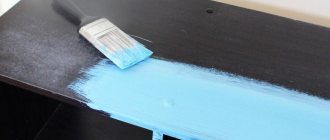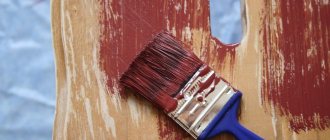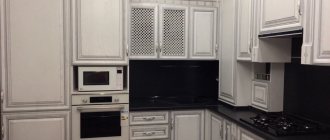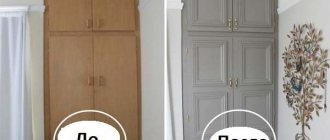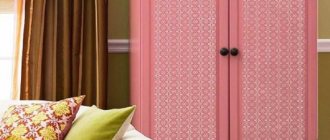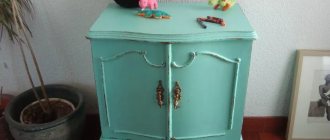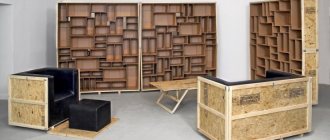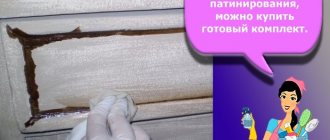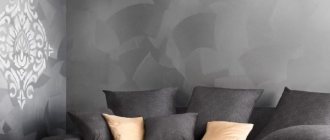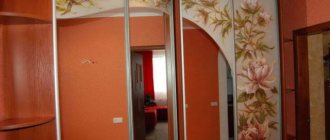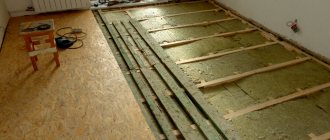Modern interior items very quickly go out of fashion or lose their attractiveness, but purchasing new ones is not always possible. This raises the question: how to repaint chipboard furniture with your own hands so that the product acquires an attractive appearance? This is not always easy to do, because the result is influenced not only by the correct choice of materials and technology, but also by the accuracy of the process.
The nuances of repainting furniture chipboard
Painting old furniture with your own hands is considered a difficult and risky procedure. The fact is that for the manufacture of interior items (cabinets, chests of drawers, kitchen modules) processed materials with a decorative layer are used. Therefore, it is necessary to correctly determine the type of coating in order to draw up a work plan.
Chipboards used in furniture production can be of the following types:
- Lacquered. Wardrobes, beds and dressing tables made more than 30 years ago are made from this material. Now this furniture is being produced again. The manufacturing technology is that several layers of varnish are applied to the decorative base. Parts processed in this way are used for facades or visible parts of the body. It is very difficult to repaint varnished products; it is much easier to polish if there is damage.
Lacquered products are the hardest to repaint - Laminated. This is a modern option that is used everywhere; furniture made from chipboard is very popular. The principle of obtaining such a surface is that the film is rolled onto a chipboard base and, under the influence of a heat press, creates a reliable and durable layer. It is difficult to repaint such material due to the fact that it is impossible to completely remove the coating, because it has adhesion to the base. This must be taken into account so as not to damage the parts being processed.
Laminated boards are coated with a polymer on top, which complicates the restoration process - Laminated. Such products are created by gluing decorative paper onto a chipboard, so the coating is unreliable. It is recommended that such elements be allowed to be repainted only after the top layer has been removed and a significant part of the glue has been cleaned off.
The paper coating can be easily peeled off the plate, after which the product is ready to apply a new decor - Veneered. The basis of the material is chipboard; veneer is glued onto it under pressure. Painting of such interior items is carried out using a limited number of compositions - these are stains and varnish. The veneer surface must be prepared carefully so as not to damage the decorative layer.
Furniture covered with natural wood veneer belongs to the elite class
There are other types of slabs, but they are not as common.
What paint to paint wooden furniture?
Thus, acrylic paints are ideal for wooden furniture. They are durable, easy to apply, odorless, and dry quickly. The huge selection of shades is also pleasing. In addition, acrylic paints have a high degree of vapor permeability, which is very important for wood.
Interesting materials:
How to dilute Aktara for violets? How to dilute Aktara for roses? How to dilute boric acid for spraying cucumbers? How to dilute boric acid to feed strawberries? How to dilute boric acid for irrigation? How to dilute alum for hydrangea? How to dilute copper sulfate for cultivating land? How to dilute ammonia for strawberries? How to dilute vanish for carpets? How to dilute phytosporin for anthurium?
How to paint old furniture
To paint boring or defective interior items, you need to select a composition suitable for these purposes. The main recommendation when choosing is to refuse cheap options.
Paint for chipboard furniture should be selected taking into account the characteristics of the composition:
- Oily. Preference should be given to well-known brands. A significant disadvantage is the unpleasant and toxic fumes, and the drying period of the solution is quite long. This mixture must be laid in thin layers, which is why the material is used infrequently.
- Acrylic. A modern version of water-dispersed paints. The composition has many positive qualities, which makes it in demand. But when working with laminated chipboard, it is necessary to purchase a solution with increased adhesion and not dilute it with water.
- Alkyd. This option is much preferable to the oil option. The product is suitable for painting furniture, but the work is carried out in well-ventilated areas due to the specific smell of the composition.
Of the three proposed, the best is acrylic paint, oil paint is affordable, and alkyd enamel is considered the golden mean
On a note! To tint or decorate small areas, spray paint is used. For example, a bedside table will require one or two containers.
Chipboard can also be repainted with other types of compositions. Stain is used only for tinting veneered material. The varnish serves to secure the decorative layer; it can act as an independent composition, but this will require complex preparation of the base. For work it is better to use a quick-drying variety.
A mandatory element of the coating is a primer; the composition must have good adhesion.
No decorative coating can be applied to chipboard without primer.
Is it possible to paint laminated chipboard without pre-matting?
Matting a laminated chipboard surface is a complex process that takes a lot of time if you don’t have a sanding machine. But it can be avoided if you use chalk paint: a mixture of chalk, clay, dyes and a binder. This composition fits well on any smooth surface.
Features of Chalk Paint:
- The natural composition is harmless to health.
- Water is used for dilution.
- The chalk mass is odorless.
- Creates a matte finish with an antique effect.
- Painted surfaces do not fade in the sun.
- Drying time for 1 layer is 8 hours.
- Drying time for 2 layers is 24 hours.
- Compared to acrylic, chalk paint is about twice as expensive.
If milk casein is used as a binder, the paint is called milk or casein paint. It has the same properties, but its decorative qualities resemble acrylic coating. Its color is rich and its surface is semi-matte. This is the best paint for laminated chipboard if you are not interested in creating an antique effect.
How to paint chipboard
Painting chipboard furniture includes two main stages:
- preparatory stage;
- painting work.
On a note! When deciding to paint laminated chipboard, it is worth considering that the end result, even if all the nuances are observed, does not always meet expectations.
It is convenient to paint chipboard from an aerosol can, especially if you need to make a pattern using a stencil
Tool selection
Various tools can be used for work:
- Spray gun. Due to the fact that furniture parts made of wood-based material have a flat base, this particular device is the best option. When spraying, the paint can be applied more evenly. The main problem with using such a tool is the correct selection of the distance. In case of erroneous calculations, drips and sagging are formed.
- Roller. This device is most often used at home. Painting with a roller is not always easy, since the applied layer must have a small thickness, otherwise sagging will become noticeable. To paint furniture, use tools with a medium-length fur coat.
- Foam sponge. Suitable for tinting and painting well-primed elements, it allows you to obtain a uniform coating, but subject to extreme care.
When restoring old furniture, you can get by with an affordable tool.
Brushes are rarely used for this process; their main purpose is decoration. They allow you to create an antique effect, but if a base layer was previously applied to hide the base.
On a note! When repainting an old table or chest of drawers, the joining of parts is taken into account: the new layer should not lead to the appearance of distortions and protruding areas.
Preparing the base
Step-by-step preparation instructions:
- Furniture is disassembled or only parts that need to be repainted are removed. It is problematic to carry out high-quality painting of parts without removing them. If you have no assembly experience, it is better to number the elements on the reverse side and draw up a diagram.
- The fittings are carefully removed, even if they are not located on the side to be painted. Its elements will complicate the process.
- The work site is prepared, everything unnecessary is removed.
If you don’t have a sander at hand, you can get by with sandpaper on a wooden block - The part is placed on a flat area. The front side is treated with sandpaper; for this you can use a hand block. Power tools are used very carefully. It is necessary to remove a small layer and create roughness on the surface to improve adhesion. Care must be taken, as chipboard is easily damaged.
- Dust and dirt are removed.
All details are processed in this way.
If it is not possible to completely disassemble the old furniture, then before painting the floor is covered with polyethylene
Repainting
Coating of fragments with paint is carried out according to the scheme:
- A primer is applied to the element. It is recommended to perform at least two treatments, each time waiting until the product is completely dry.
- The coloring composition is being prepared. It is stirred well and tinted if necessary.
- The mixture is poured into a convenient roller container. The instrument is soaked in the solution and the excess is squeezed out.
- Painting starts from the middle. The mixture rolls out well over the base, the movements should be parallel, and a thick layer should not be allowed to be created. The first layer is the base; you need to wait until it dries completely.
- Then the main coating is applied according to the previous principle.
- When using a spray gun, you will need to dilute the composition used. To select the optimal distance, training staining is carried out.
Regardless of the type of composition, the surface is painted in 2 - 3 layers.
If the part will experience constant exposure, then an additional layer of varnish is applied.
Finish coating
Laminated chipboard has a smooth surface, but after sanding and applying paint it becomes matte. You can restore the shine of furniture and additionally protect painted surfaces by covering them with water-based varnish.
After the varnish has dried, the surface can be polished with a mildly abrasive auto polish, because it is almost impossible to apply the varnish with a brush or roller in an even layer and there will be small or noticeable waves on the surface; after polishing, the surface will be perfectly smooth and glossy.
Advice! It is recommended to purchase products for pre-treatment, coloring and finishing from the same company: they can definitely be used together, and the compositions of products from different manufacturers may be incompatible with each other.
Painting furniture yourself is quite simple: if you follow these recommendations, the new coating will be perfectly smooth, and the result will last for many years.
Furniture decoration
Decorating such material is not very easy. There are many recommendations for creating a Provence style, but achieving the effect that is obtained on furniture made of wood, plywood or MDF will not work. This is explained by the fact that chipboard products rarely have the required appearance.
Using simple devices on chipboard furniture you can create true masterpieces
You can diversify the interior in the following ways:
- Paint the countertop or dresser fronts white and other front parts black. For this, paint with a glossy finish is used. The technology is completely the same as described above, but the difference is that three layers of varnish are applied to the parts. The first layer is left untreated, and subsequent layers are sanded and polished.
To work using the Decoupage technique (artificial aging), special paints are used
- Aging. To create this effect, after laying the base coat, apply a darker color of paint with a brush. The movements should be sweeping and slightly uneven; a diluted white compound can be applied on top. Everything is fixed with varnish.
Before repainting chipboard furniture, it is recommended to experiment a little. This will allow you to evaluate the result and, possibly, choose a more suitable decoration option.
Pre-treatment of surfaces
Before painting, laminated surfaces must be prepared so that the paint lays evenly and adheres firmly.
You will need:
- dishwashing liquid;
- sponge;
- roller, brush;
- primer tray;
- rubber spatula;
- putty;
- a set of sandpaper;
- Sander;
- rags;
- gloves, protective mask and goggles.
The final result will depend on how well the surfaces are prepared.
Advice! If the product consists of many parts (a table with drawers, for example), then it is recommended to disassemble it before painting. Furniture of simple shapes - a wardrobe - can not be disassembled if you only need to refresh the facade by painting it white.
Sanding
The next step is to sand the surfaces. After sanding, the coating will acquire a rough structure, and it will be easier to paint and the paint will adhere better. Start with coarse-grained sandpaper and finish with fine-grained sandpaper. You can get the job done faster by using a grinder.
If you use a sander, it is important not to overdo it and sand evenly over the entire surface, otherwise you may end up with a wavy surface with different sanding depths.
Important! During work, the respiratory tract must be protected with a protective mask: the substances contained in laminated chipboard can be harmful.
Degreasing
All surfaces that are planned to be painted are thoroughly washed, removing dust and dirt. Then degrease using a sponge with dishwashing detergent applied to it, rinse off and wipe the treated surfaces with a clean, dry cloth or napkin.
Leveling surfaces
If the furniture has chips, cracks or other imperfections, they should be repaired at this stage before painting. It is best to fill all the recesses with latex-based putty or special products with epoxy resin. When the mass hardens, the surface is leveled with sandpaper.
After this, the product is primed again and dried thoroughly.
Padding
It is much easier to paint surfaces treated with a primer: the paint goes on smoothly and no air bubbles form.
It is advisable to purchase a primer that is suitable for smooth surfaces (tiles, glass). You can also use bumper priming compounds - they come in cans, making application more convenient and quicker. While working, you must wear a protective mask.
After applying the primer layer, you need to let it dry. This process can take about 12 hours; you can find out more precisely by studying the label of a particular product.
